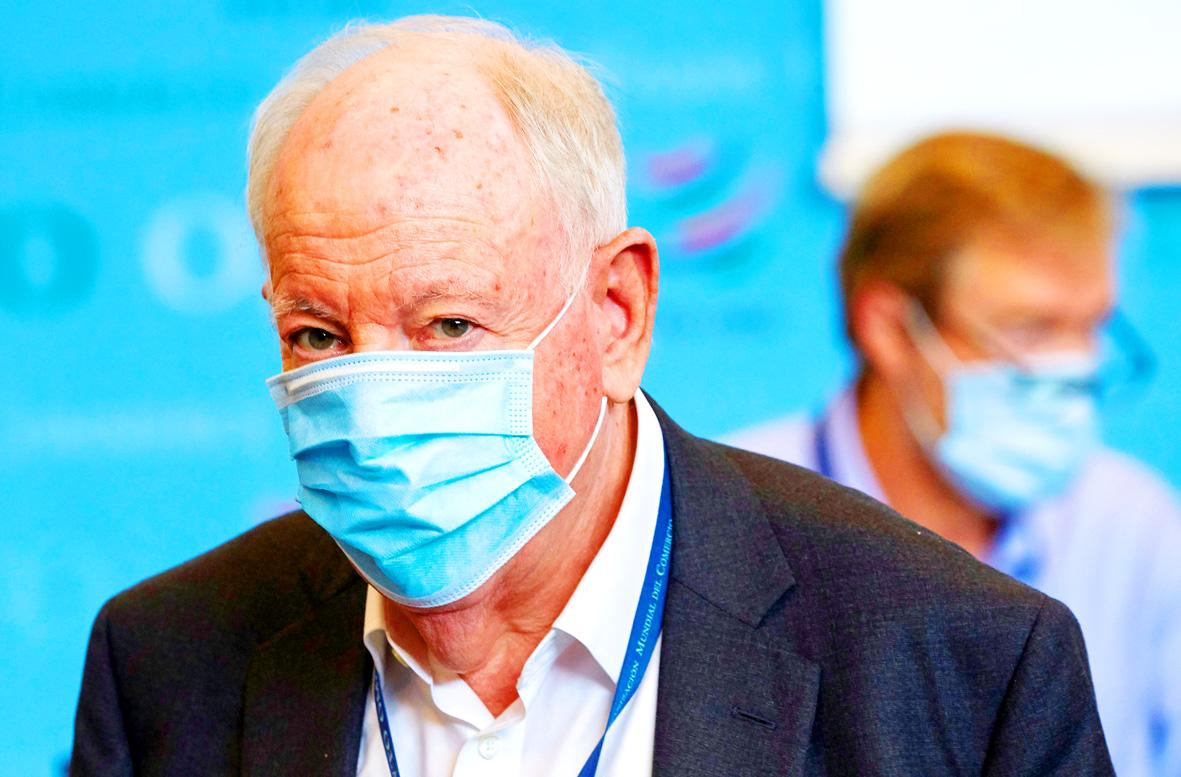G20 economies should work to provide trillions of US dollars in trade financing for developing countries to ensure the recovery of the global economy from the COVID-19 pandemic, a top WTO official said on Saturday.
WTO Deputy Director-General Alan Wolff told G20 leaders it was critical to utilize trade to help underwrite the economy, facilitate trade in essential medical supplies and reform the institutional framework for world trade.
“When crops do not move and factories are idled throughout the developing world, the global recovery will be delayed for all,” the American said. “A trade finance initiative should be seen as an essential part of improving the outlook for economic recovery.”

Photo: Reuters
The World Economic Forum this year said that the pandemic was exacerbating a gap in global trade funding that was already at US$1.5 trillion before the crisis began, with over 50 percent of requests for trade funding being rejected.
The lack of access to financing hits least developed countries hardest.
Cooperation between international institutions, the WTO and commercial banks would be needed to free up trillions of US dollars in required funding, Wolff said.
G20 leaders were set to underscore their commitment to the multilateral trading system in a joint statement to be signed yesterday, a draft of the communique showed.
The Switzerland-based WTO is in turmoil as the administration of US President Donald Trump has blocked the selection of a new director-general and the functioning of a dispute settlement body.
Wolff urged G20 leaders to engage in a “major institutional reform effort” and restore the WTO’s deliberative and negotiating functions.
Wolff also called for new measures to speed up the supply of essential medical products.
Barriers at borders and export restrictions should be reduced, particularly for the benefit of the poorest countries, he said.

Among the rows of vibrators, rubber torsos and leather harnesses at a Chinese sex toys exhibition in Shanghai this weekend, the beginnings of an artificial intelligence (AI)-driven shift in the industry quietly pulsed. China manufactures about 70 percent of the world’s sex toys, most of it the “hardware” on display at the fair — whether that be technicolor tentacled dildos or hyper-realistic personalized silicone dolls. Yet smart toys have been rising in popularity for some time. Many major European and US brands already offer tech-enhanced products that can enable long-distance love, monitor well-being and even bring people one step closer to

Malaysia’s leader yesterday announced plans to build a massive semiconductor design park, aiming to boost the Southeast Asian nation’s role in the global chip industry. A prominent player in the semiconductor industry for decades, Malaysia accounts for an estimated 13 percent of global back-end manufacturing, according to German tech giant Bosch. Now it wants to go beyond production and emerge as a chip design powerhouse too, Malaysian Prime Minister Anwar Ibrahim said. “I am pleased to announce the largest IC (integrated circuit) Design Park in Southeast Asia, that will house world-class anchor tenants and collaborate with global companies such as Arm [Holdings PLC],”

TRANSFORMATION: Taiwan is now home to the largest Google hardware research and development center outside of the US, thanks to the nation’s economic policies President Tsai Ing-wen (蔡英文) yesterday attended an event marking the opening of Google’s second hardware research and development (R&D) office in Taiwan, which was held at New Taipei City’s Banciao District (板橋). This signals Taiwan’s transformation into the world’s largest Google hardware research and development center outside of the US, validating the nation’s economic policy in the past eight years, she said. The “five plus two” innovative industries policy, “six core strategic industries” initiative and infrastructure projects have grown the national industry and established resilient supply chains that withstood the COVID-19 pandemic, Tsai said. Taiwan has improved investment conditions of the domestic economy

MAJOR BENEFICIARY: The company benefits from TSMC’s advanced packaging scarcity, given robust demand for Nvidia AI chips, analysts said ASE Technology Holding Co (ASE, 日月光投控), the world’s biggest chip packaging and testing service provider, yesterday said it is raising its equipment capital expenditure budget by 10 percent this year to expand leading-edge and advanced packing and testing capacity amid strong artificial intelligence (AI) and high-performance computing chip demand. This is on top of the 40 to 50 percent annual increase in its capital spending budget to more than the US$1.7 billion to announced in February. About half of the equipment capital expenditure would be spent on leading-edge and advanced packaging and testing technology, the company said. ASE is considered by analysts